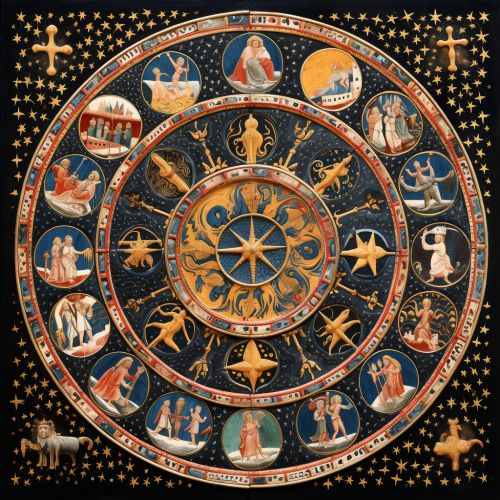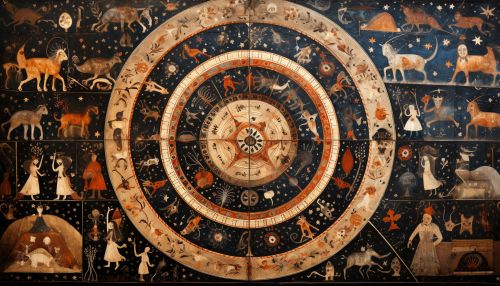Astrology
Introduction
Astrology is an ancient practice that interprets the influence of celestial bodies on human affairs. It is a pseudoscientific study of the movements and relative positions of celestial objects, which is used to divine information about human affairs and terrestrial events.


History of Astrology
Astrology has been dated to at least the 2nd millennium BCE, with roots in calendrical systems used to predict seasonal shifts and interpret celestial cycles as signs of divine communications. The practice was prevalent in the ancient world and was used in the traditions of the Babylonians, the Greeks, the Romans, the Hindus, and the Chinese.
Babylonian Astrology
Babylonian astrology was the first organized system of astrology, arising in the 2nd millennium BC. The Babylonians viewed celestial events as possible signs rather than as causes of physical events.
Hellenistic Astrology
The conquest of Asia by Alexander the Great exposed the Greeks to the cultures and cosmological ideas of Syria, Babylon, Persia and central Asia. Greek overtook cuneiform script as the international language of intellectual communication and part of this process was the transmission of astrology to the Hellenistic world.
Roman and Medieval Astrology
Astrology was taken up by Islamic scholars following the collapse of Alexandria to the Arabs in the 7th century, and the founding of the Abbasid empire in the 8th century. The second Abbasid caliph, Al Mansur (754-775) founded the city of Baghdad to act as a centre of learning, and included in its design a library-translation centre known as Bayt al-Hikma 'House of Wisdom', which continued to receive development from his heirs and was to provide a major impetus for Arabic-Persian translations of Hellenistic astrological texts.
Chinese and East Asian Astrology
Chinese astrology has a close relation with Chinese philosophy (theory of the three harmonies: heaven, earth and man) and uses concepts such as yin and yang, the Five Phases, the 10 Heavenly Stems, the 12 Earthly Branches, and shichen (a form of timekeeping used for religious purposes).
Astrological Systems
There are many different systems of astrology, each with their own unique interpretations and methods. Some of the most well-known systems include Western astrology, Vedic astrology, and Chinese astrology.
Western Astrology
Western astrology is a system of interpretation based upon the positions of the Sun, Moon, and planets, which are analyzed by their movement through signs of the zodiac (space and time) and by their aspects (angles) relative to one another.
Vedic Astrology
Vedic astrology, also known as Jyotish, is the traditional Hindu system of astrology. It is based on the sidereal zodiac, in which stars are considered to be the fixed background against which the motion of the planets is measured.
Chinese Astrology
Chinese astrology is based on the traditional astronomy and calendars. It does not calculate the positions of the sun, moon and planets at the time of birth. The zodiac of a given year is an animal sign, determined by the year's stem-branch.
Astrology and Science
Astrology has been criticized for failing to provide a physical mechanism that links the movements of celestial bodies to their purported effects on human behavior. In that sense, astrology is considered a pseudoscience, as it does not meet the criteria of the scientific method.
Astrology in Popular Culture
Astrology has had an influence on both language and literature. For example, the terms "mercurial," "venereal," "lunatic," "saturnine," and "jovial" are all derived from the planets' names. In literature, astrology has played a significant role in the narrative framework of certain works, such as the Canterbury Tales by Geoffrey Chaucer.
